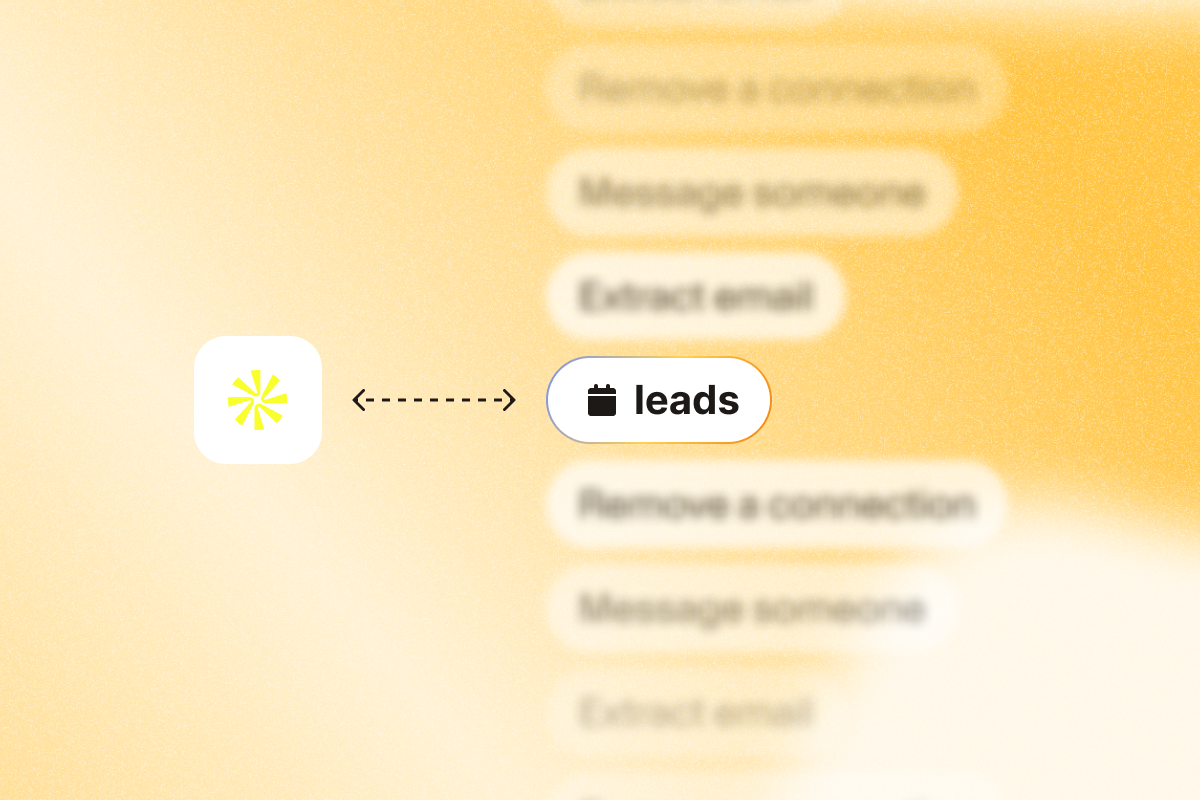Apollo.io is a popular sales intelligence platform that helps teams find, engage, and convert leads.
This guide covers its key features, pricing, pros and cons, and alternatives to help you decide if it’s the right tool for your lead-generation strategy.
AI highlights
- Apollo.io helps sales reps generate leads with advanced search filters, sales intelligence, and AI-powered lead scoring to help teams find and engage high-potential prospects.
- Automation features like multi-step sequences, CRM integrations, and a Chrome extension make prospecting faster and more efficient.
| Feature | Apollo.io | PhantomBuster | Sales Navigator | ZoomInfo |
| Top Feature | Large contact database | Real-time lead extraction | Live LinkedIn insights | Deep firmographic data |
| Pros | Huge database, AI scoring | Fresh data, multi-channel | Direct LinkedIn access | Extensive company insights |
| Cons | Data accuracy issues | Requires setup | No email automation | Expensive, paywalled data |
| Intent Data | Basic | Social engagement tracking, LinkedIn activity | Job changes, engagement | Website visits, content interest |
| Data Accuracy | Can be outdated | High (real-time scraping) | High (LinkedIn profiles) | High (but requires verification) |
| Automated Outreach | Email, sequences | Email, LinkedIn, multi-step | InMail, connection requests | No built-in outreach |
| CRM Integrations | ✅ | ✅ | ✅ | ✅ |
| Chrome Extension | ✅ | ✅ | ❌ | ✅ |
| Free Trial | ✅ (Free plan) | ✅ | ❌ | ❌ |
| Pricing From | $49/user/mo | $56/mo | $99/user/mo | ~$15,000/year |
| G2 Rating | 4.7 | 4.3 | 4.3 | 4.5 |
Is Apollo.io good for lead generation?
Apollo.io is a well-known sales intelligence tool designed to help sales teams find, qualify, and engage leads more efficiently.
It boasts a huge database (210M+ contacts, 35M+ companies), advanced search filters, and automated outreach features to streamline prospecting.
Sales teams appreciate Apollo.io for its intuitive interface and robust data-driven lead-generation tools.
However, some users report issues with data accuracy and technical glitches, particularly with phone numbers and the dialer.
One frustrated reviewer shared:
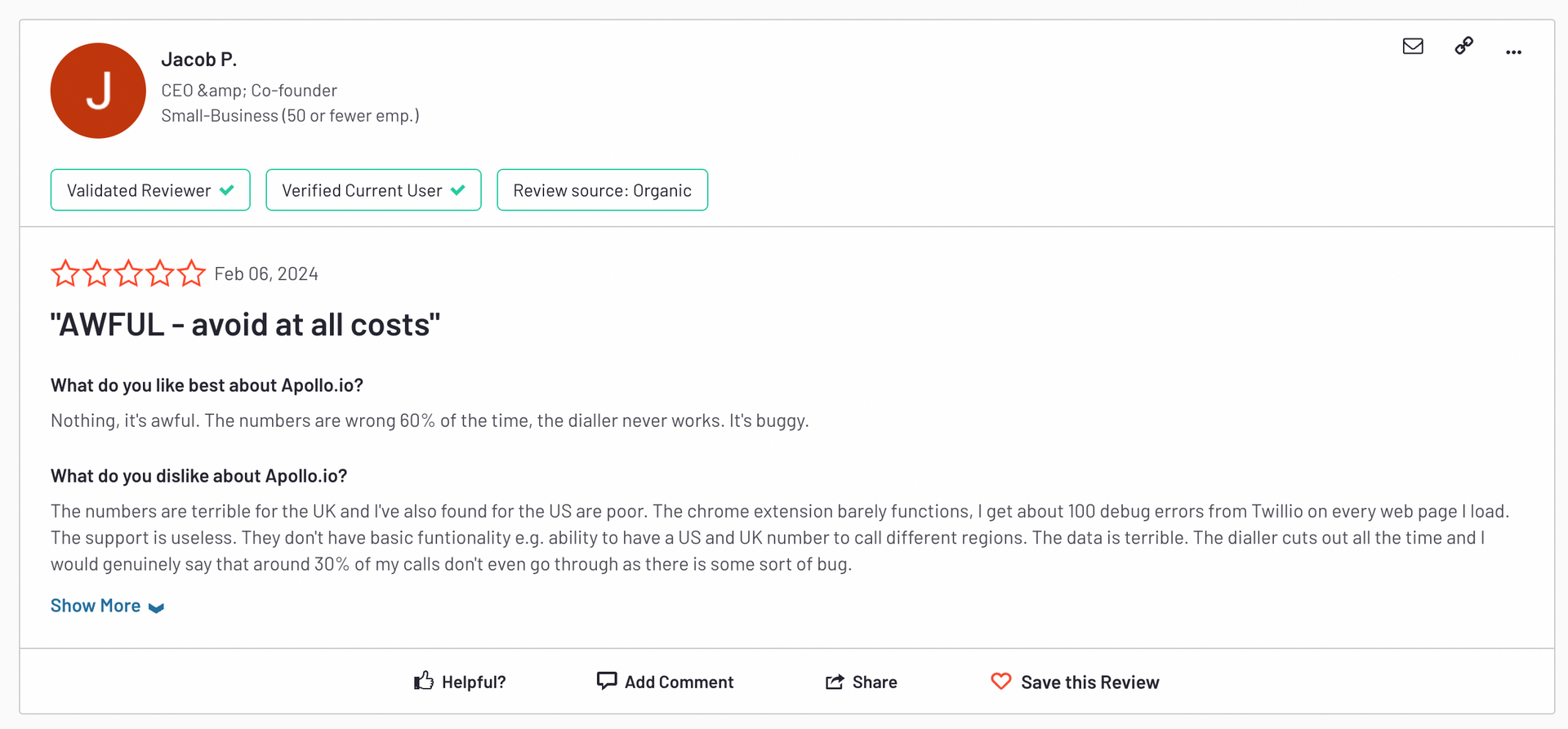
How does Apollo.io get leads?
Apollo.io gathers leads from public sources, partnerships, and web scraping. It uses machine learning and third-party vendors to verify emails and phone numbers.
💡 What this means for you:
- Lots of leads but mixed accuracy—some data may be outdated.
- Verification helps, but errors remain—bounced emails and wrong numbers.
For fresher data, consider a tool that pulls leads in real-time from LinkedIn, for example, instead of a static database.
Apollo.io’s key features
Apollo.io helps sales teams find, qualify, and engage leads faster with a mix of data, automation, and sales prospecting tools.
Here’s what stands out.
Advanced search filters
Precise targeting improves prospecting success. Apollo.io’s 65+ filters refine searches by:
- Firmographics: Industry, company size, revenue.
- Technographics: Tech stack, software used.
- Geographics: Location, HQ, market presence.
- Job role and seniority: Decision-makers vs. lower-level contacts.
- Intent signals: Funding rounds, recent hires, site activity.
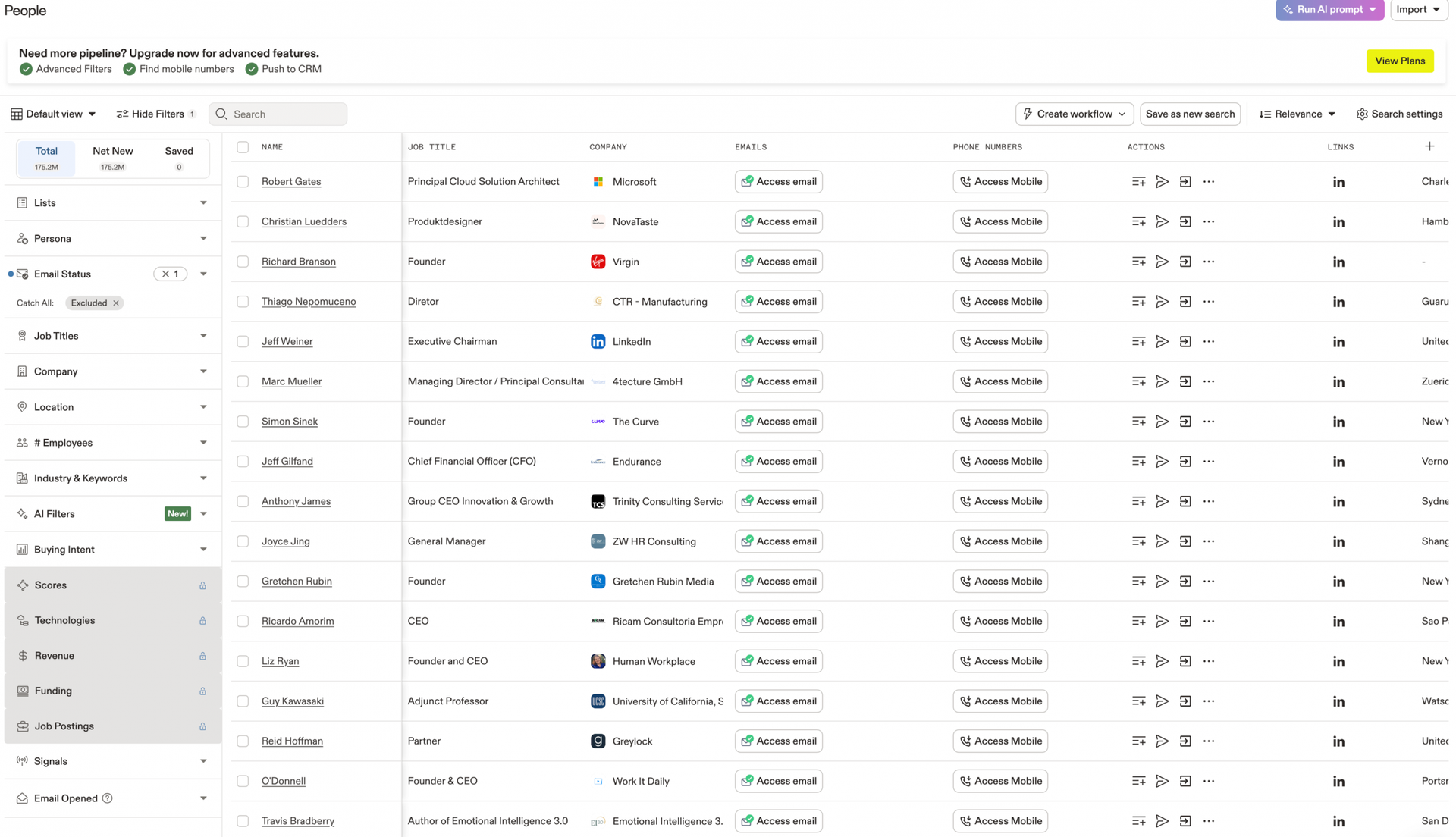
Sales intelligence
Apollo.io goes beyond contact data by analyzing sales calls to help teams optimize their sales processes.
- Call transcriptions and insights: AI-powered analysis extracts key moments from sales conversations.
- Sentiment analysis: Understand lead engagement and fine-tune your messaging.
- Coaching recommendations: Identify what works and refine sales scripts for better conversions.
Instead of guessing what resonates with prospects, sales teams can use real conversation data to optimize their pitch and close deals more effectively.
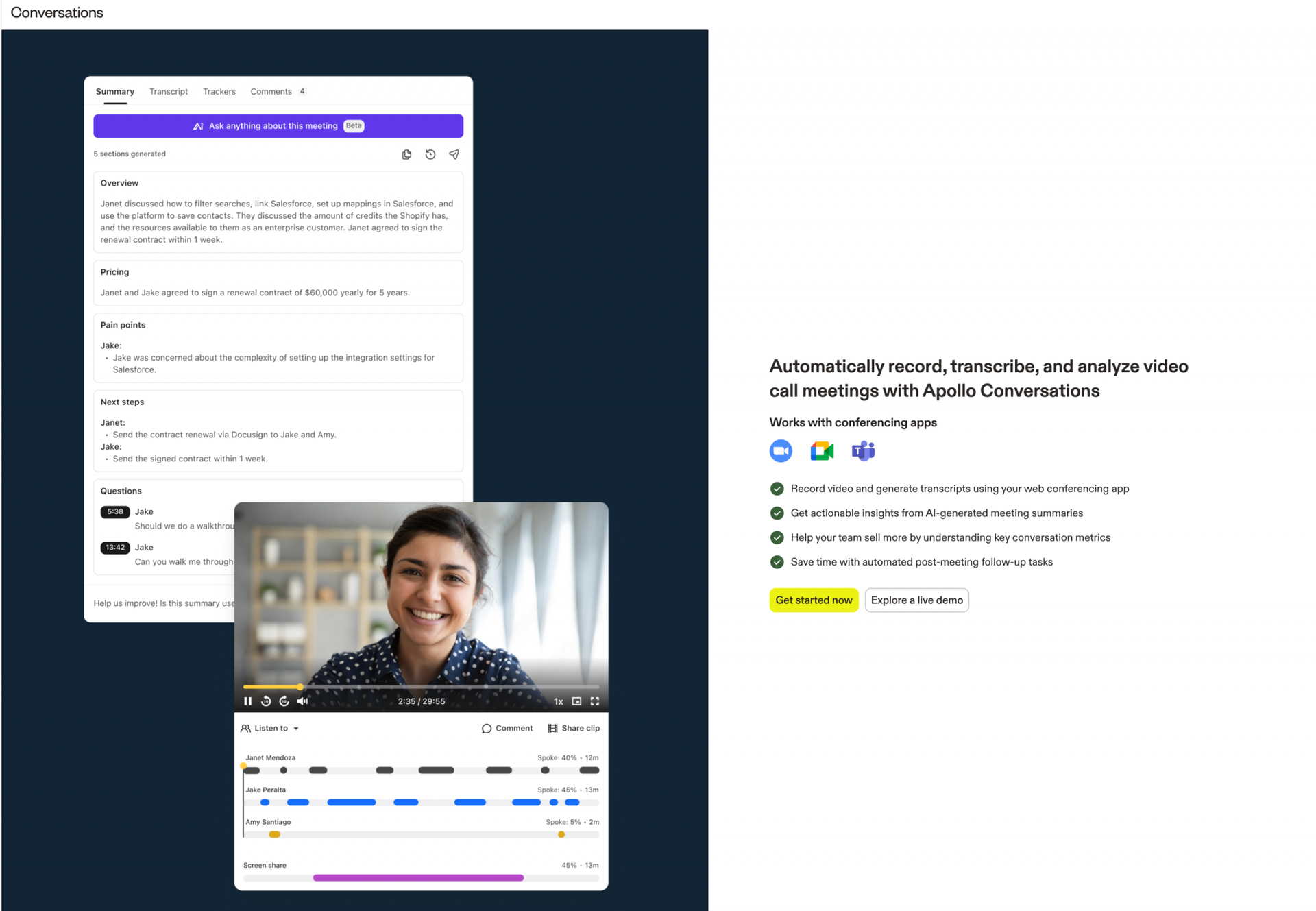
Data enrichment
Having outdated contact data leads to bounced emails, invalid phone numbers, and lost sales opportunities.
Apollo.io’s data enrichment tool fixes this by:
- Updating old records with fresh contact details.
- Filling in missing information: Such as direct dials and LinkedIn URLs.
- Syncing with CRMs to keep databases clean and accurate.
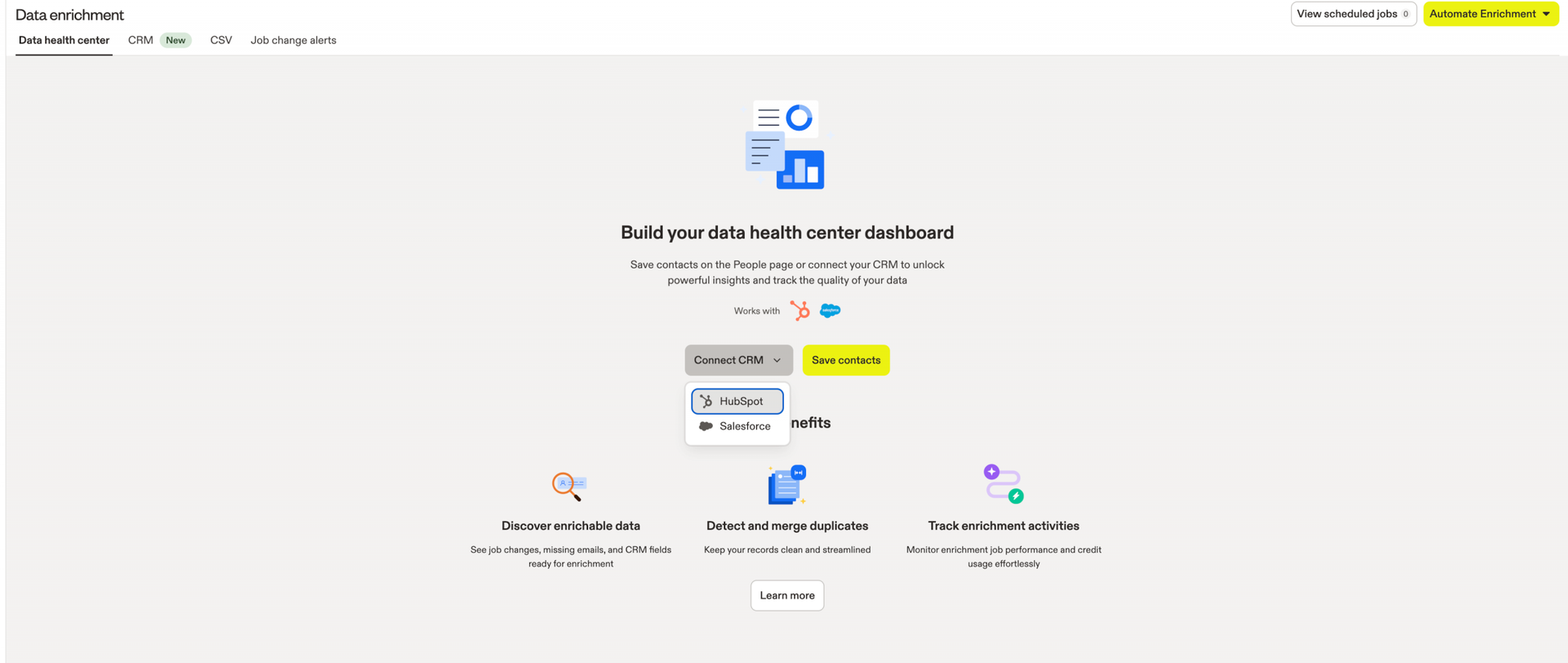
AI-powered lead scoring
Not all leads are equal. AI-powered lead scoring helps you focus on high-priority prospects while nurturing lower-ranked leads.
Apollo.io uses machine learning to rank prospects based on:
- Engagement history: Like email opens, site visits, previous interactions.
- Firmographic fit: How well they match your ICP.
- Buying signals: Track funding, hiring, and tech adoption.

Sales engagement
Apollo.io automates and tracks outreach, ensuring no lead slips through the cracks.
Key features include:
- Automated multi-step cadences (email, LinkedIn, calls).
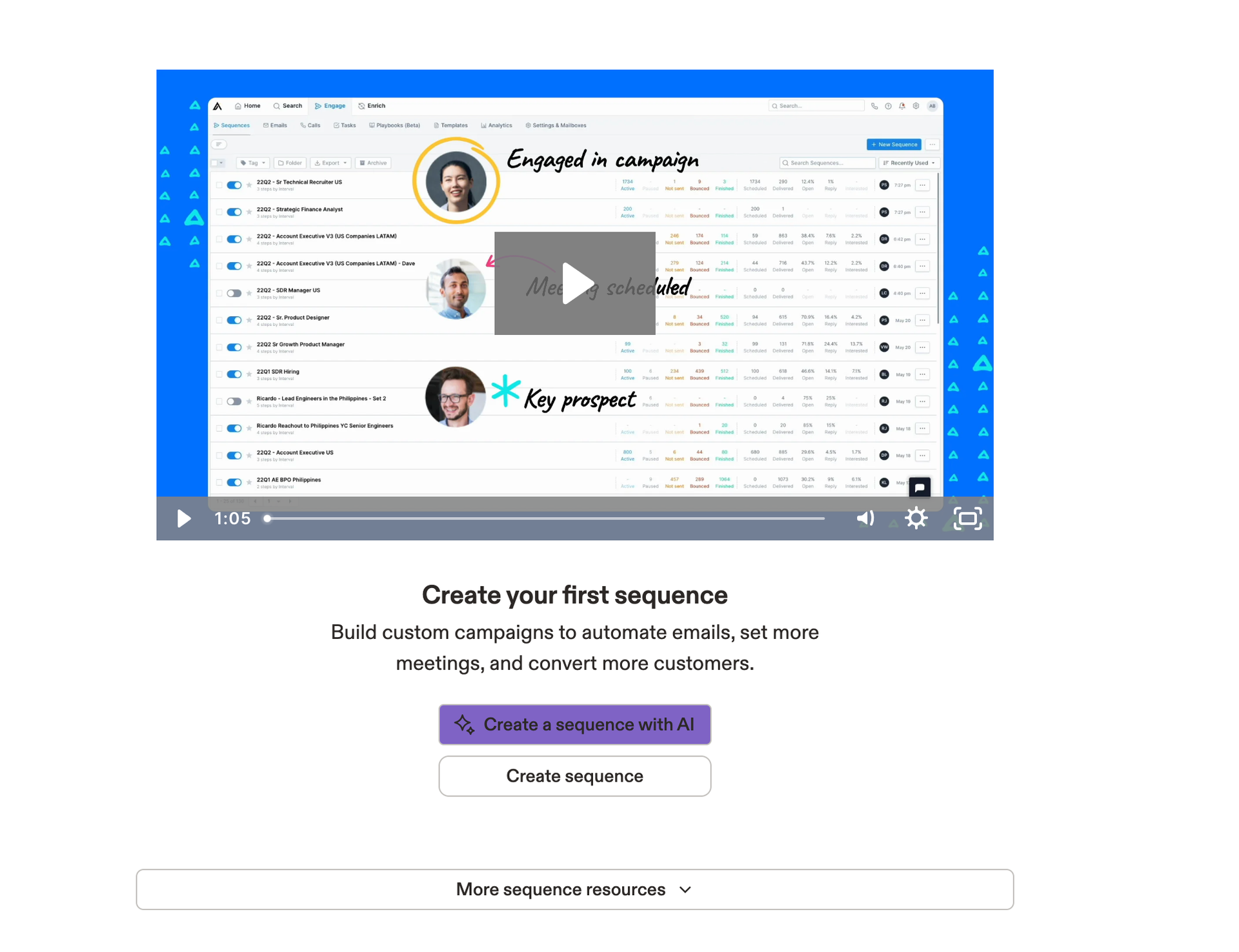
- Engagement tracking (opens, clicks, responses).
- Pre-built email templates optimized for sales.
This G2 reviewer highlighted how Apollo.io’s automation makes outreach easier:
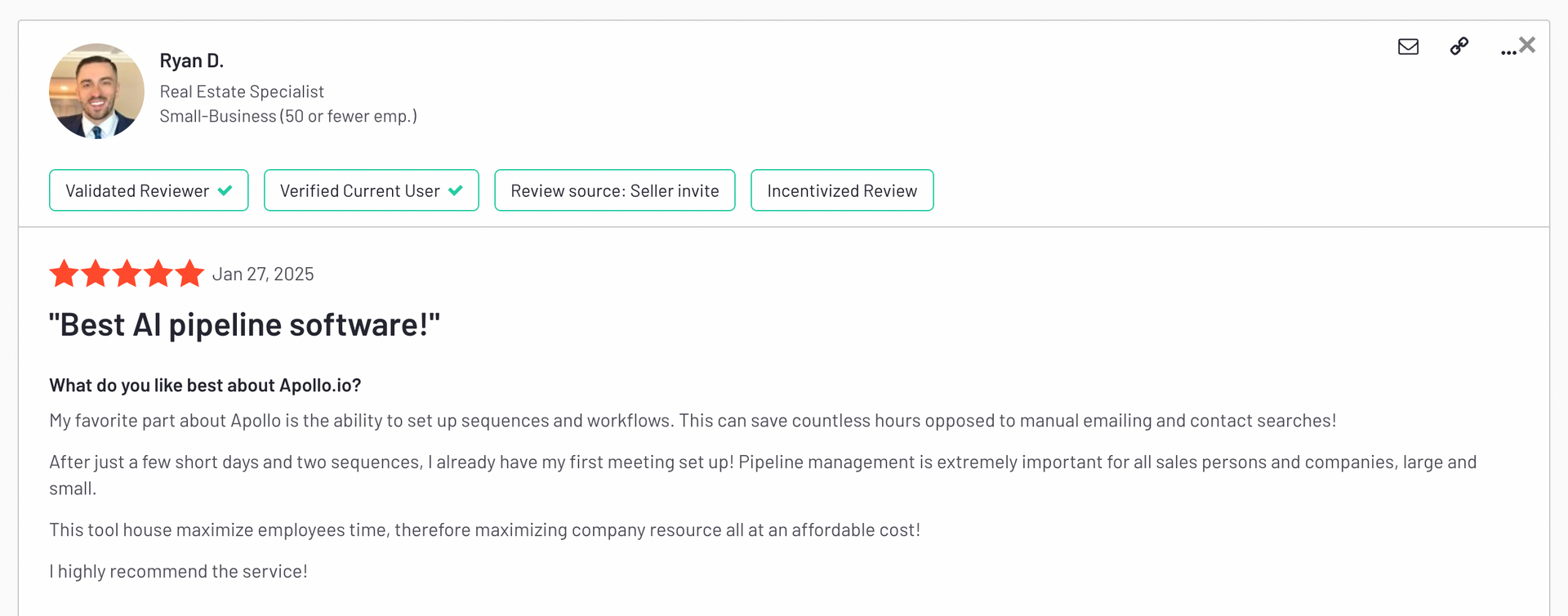
CRM integrations
Managing leads across multiple tools can slow you down. Apollo.io integrates with major CRMs (Salesforce, HubSpot, Pipedrive), allowing:
- No manual data entry: Lead details update in real time.
- Better tracking: See every interaction inside your CRM.
- Consistent workflows: Avoid duplicate records and outdated info.
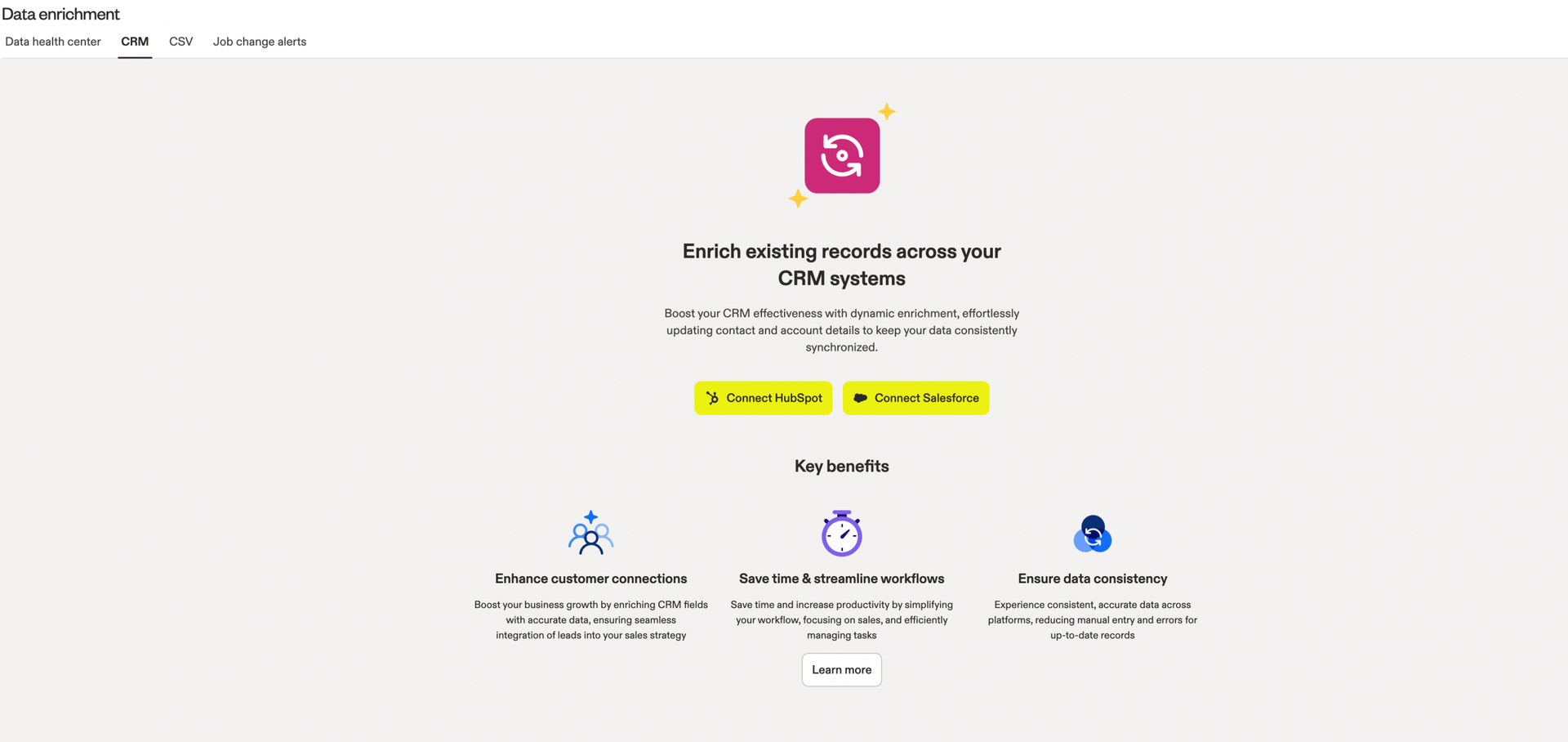
Chrome extension
For on-the-go prospecting, Apollo.io’s Chrome extension turns everyday browsing into real-time lead searching, saving time and reducing friction.
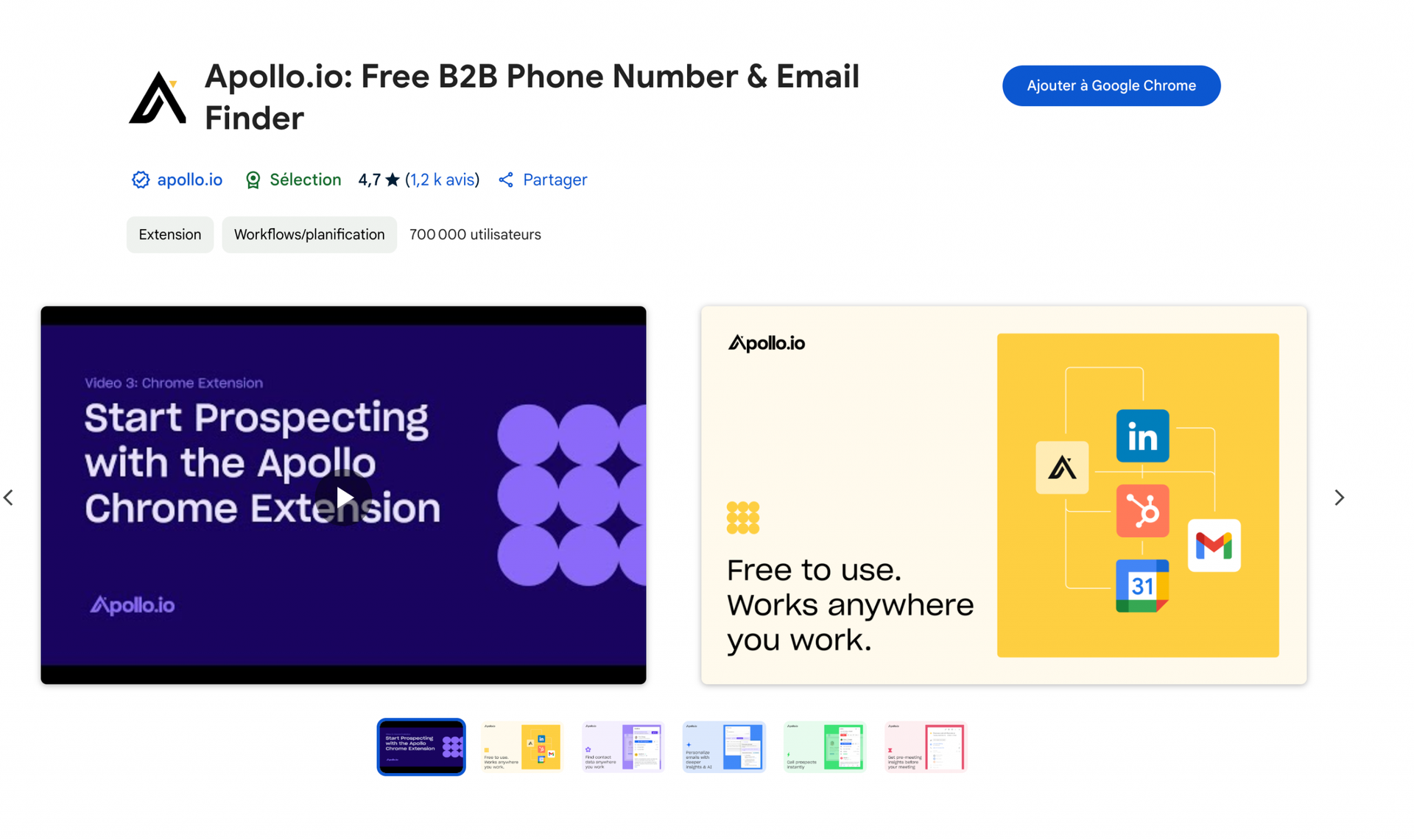
It lets you:
- Extract emails and phone numbers from LinkedIn and websites.
- Add contacts directly to Apollo.io or your CRM.
- Start outreach without leaving the page.
Apollo.io’s pros and cons
Apollo.io has strong lead generation capabilities, but some users report data accuracy concerns, contact management issues, and privacy considerations.
Here’s what users highlight most:
✅ Ease of use: Intuitive interface and simple navigation make it easy to get started.
✅ Helpful for sales teams: Sales reps appreciate the built-in automation and lead enrichment.
✅ Strong lead generation: Large database with detailed filtering options.
✅ Saves research time: Buying intent signals help users prioritize leads faster, reducing time spent searching for prospects.
✅ Effective multi-channel sequencing: Helps train and automate outreach across email, calls, and LinkedIn, making follow-ups easier, as highlighted by this reviewer.
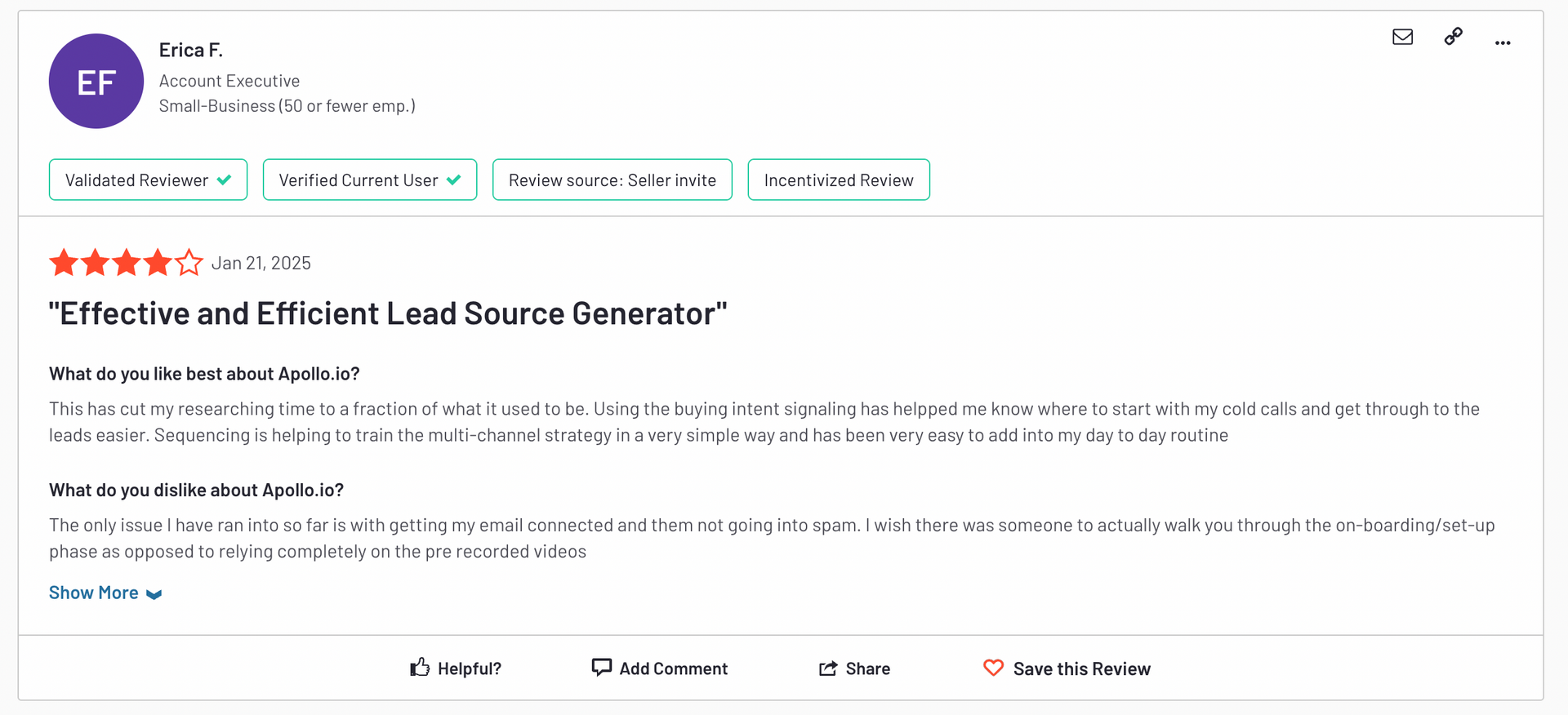
❌ Missing features: Some users find key sales tools lacking, such as deeper analytics and integrations.
❌ Contact management issues: CRM sync and data organization could be improved.
❌ Data inaccuracy: Some users report outdated or incorrect emails and phone numbers, leading to bounced emails and wasted lead generation efforts.
❌ CRM data sharing requirement: Some users report that unless they choose the most expensive plan, they must agree to let Apollo scrape data from their CRM to enrich its platform, which raises privacy concerns.
❌ Marketing-heavy customer service: While customer support is available, some users feel it’s more focused on upselling rather than resolving issues, as highlighted by this G2 reviewer.
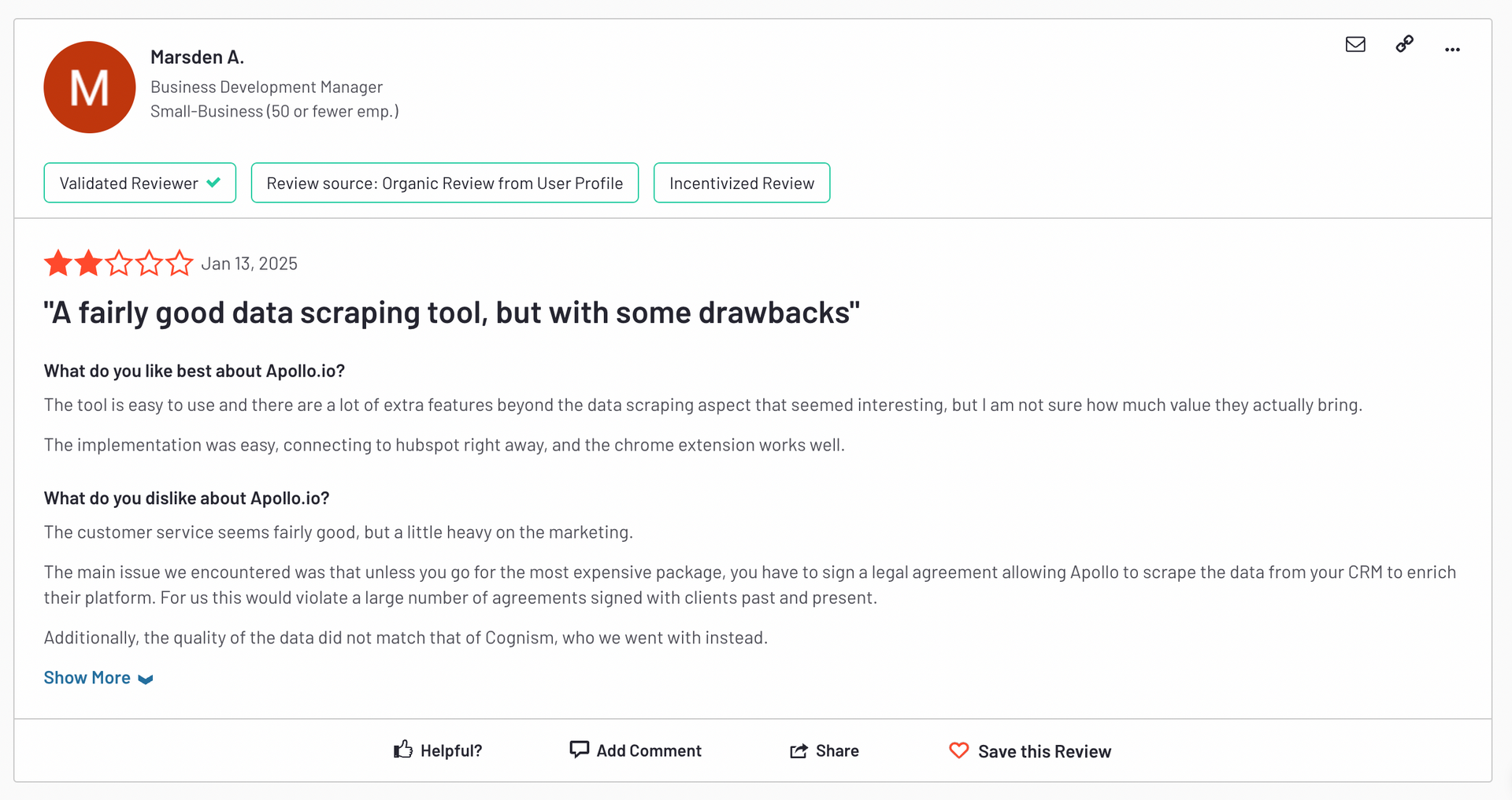
How much does Apollo.io cost?
Apollo.io offers four pricing plans designed to attract sales teams looking for an all-in-one prospecting and outreach solution. Each plan is priced per user per month, with annual billing discounts available.
Let’s break down Apollo’s pricing to see if it is worth the investment.
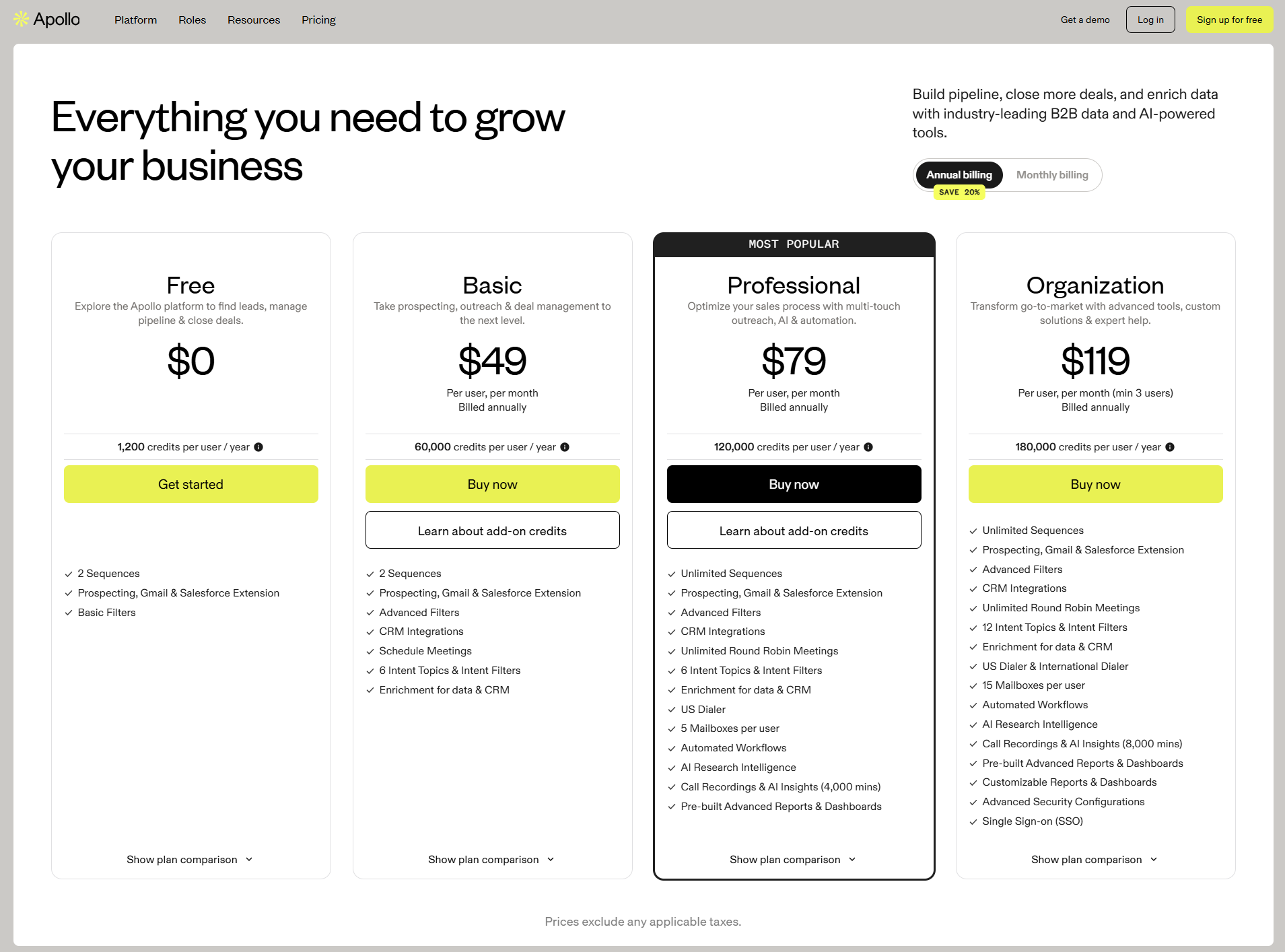
Free plan
💰 $0/month
Features:
✅ Access to Apollo.io’s database (limited search and export credits).
✅ Basic search and filtering.
✅ Up to 250 email sends per day.
✅ Website visitor tracking.
✅ Buying intent data.
✅ Salesforce & HubSpot integrations.
Not included:
❌ No advanced automation or multi-touch sequences.
❌ No data enrichment or lead scoring.
❌ Limited CRM integration capabilities.
Basic plan
💰 $49/user/month (billed annually)
Features:
Everything in Free, plus:
✅ More search and export credits.
✅ Basic sales engagement tools (email automation, sequences).
✅ More email sends per day.
Not included:
❌ No advanced AI-powered automation or analytics.
❌ No multi-channel sequences (LinkedIn, calls, emails).
Professional plan
💰 $79/user/month (billed annually)
Features:
Everything in Basic, plus:
✅ AI-powered lead scoring to prioritize high-converting leads.
✅ Multi-touch sequences (emails, calls, LinkedIn).
✅ Advanced search filters.
✅ Higher search and export limits.
Not included:
❌ No enterprise-level analytics.
❌ No priority support.
Organization plan
💰 $119/user/month (billed annually, 3-user minimum)
Features:
Everything in Professional, plus:
✅ Advanced analytics and reporting.
✅ Higher-level security and compliance features.
✅ More search/export credits.
✅ Priority support.
Not included:
❌ May still require external enrichment tools for better data accuracy.
Apollo.io alternatives
Apollo.io is a popular choice for sales prospecting, but it may not be the best fit for every team, especially if you need real-time data, better accuracy, or more flexible integrations.
Here are some of the best Apollo.io’s alternatives.
PhantomBuster
PhantomBuster is a lead generation and automation platform that helps businesses extract high-quality leads from social media, enrich them with real-time data, and automate outreach across multiple channels.
Unlike Apollo.io, which relies on a large but static contact database, PhantomBuster scrapes and verifies fresh lead data in real time to provide sales professionals with the most accurate data.
Why choose PhantomBuster over Apollo.io?
Compared to Apollo, here’s how PhantomBuster stands out:
✅ Real-time lead extraction: Unlike Apollo.io’s static database, PhantomBuster pulls up-to-date information from LinkedIn, Twitter, Sales Navigator, and other sources.
✅ Higher data accuracy: Apollo.io relies on pre-stored contacts, while PhantomBuster verifies and enriches data in real-time.
✅ Multi-channel automation: Apollo.io focuses on email, while PhantomBuster automates LinkedIn outreach, emails, and follow-ups.
✅ No CRM data-sharing: Apollo.io’s lower-tier plans require CRM data-sharing for enrichment, whereas PhantomBuster doesn’t.
✅ Seamless CRM integration: Apollo.io limits integrations to higher tiers, while PhantomBuster works with HubSpot, Salesforce, and more at all levels.
✅ Better value: Apollo.io charges per user, while PhantomBuster offers flexible pricing based on automation needs.
Pricing
After a 14-day free trial, PhantomBuster’s pricing starts at $56/month and includes 20 hours of execution time, 10,000 AI credits, 5 automation slots, and 500 email discovery credits.
LinkedIn Sales Navigator
LinkedIn Sales Navigator is a real-time prospecting tool that helps sales professionals find and connect with leads using advanced search filters, track buyer intent, and engage prospects directly through InMail and connection requests.
Unlike Apollo.io, which relies on a pre-built database, Sales Navigator provides live access to LinkedIn’s 1B+ members, ensuring up-to-date contact info.
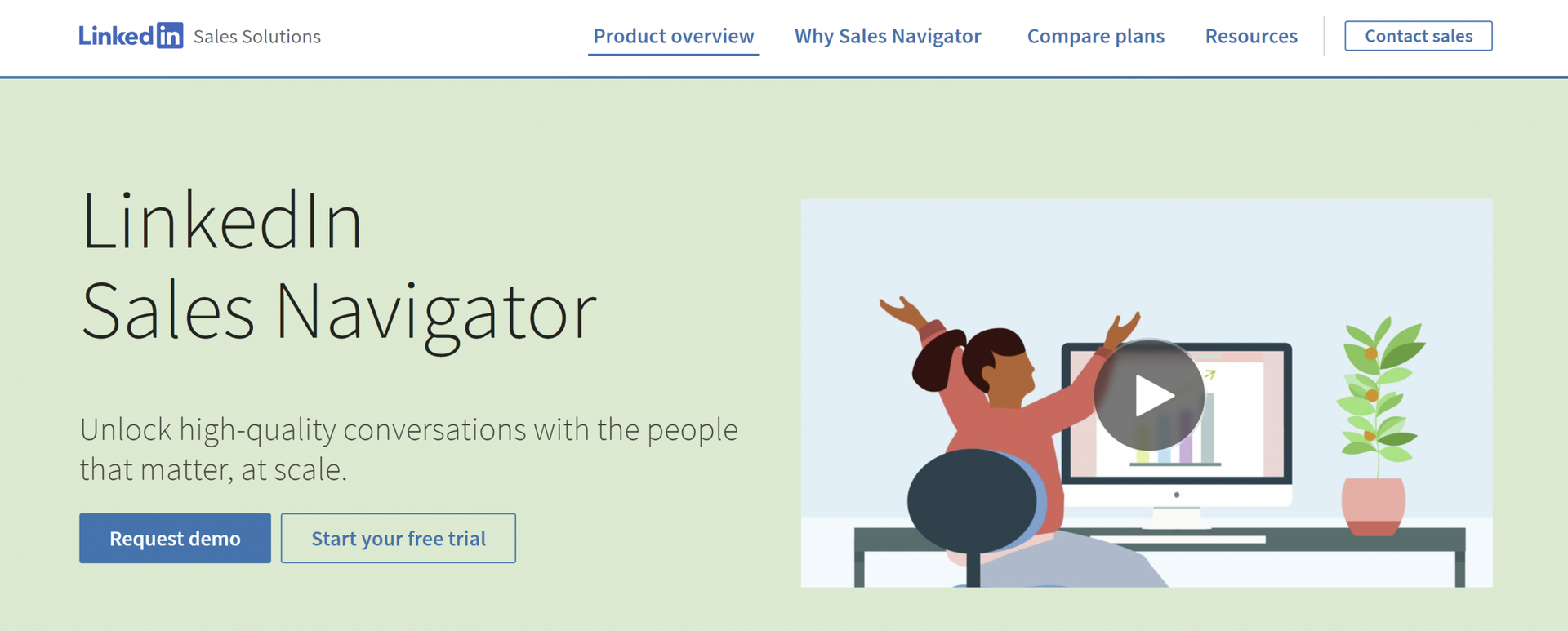
Why choose LinkedIn Sales Navigator over Apollo.io?
✅ Real-time data: Quickly pull verified contact data directly from LinkedIn profiles, while Apollo.io’s database can be outdated.
✅ Direct outreach: Message leads via InMail, not just email.
✅ Stronger buying signals: Track job changes, promotions, and company growth in real time.
✅ Fewer data accuracy concerns: Contacts manage their own LinkedIn profiles.
✅ Better for social selling: Build relationships instead of relying on cold outreach.
Pricing
Sales Navigator starts at €99.99/month per user, with higher tiers for team collaboration and advanced analytics.
ZoomInfo
ZoomInfo is a B2B contact and lead generation platform that helps teams access a massive contact database, and identify buying intent through website visits, ad engagement, and content consumption.
ZoomInfo is a strong database-driven alternative, as it offers deeper company insights and stronger intent tracking, making it a better fit for enterprise sales teams.
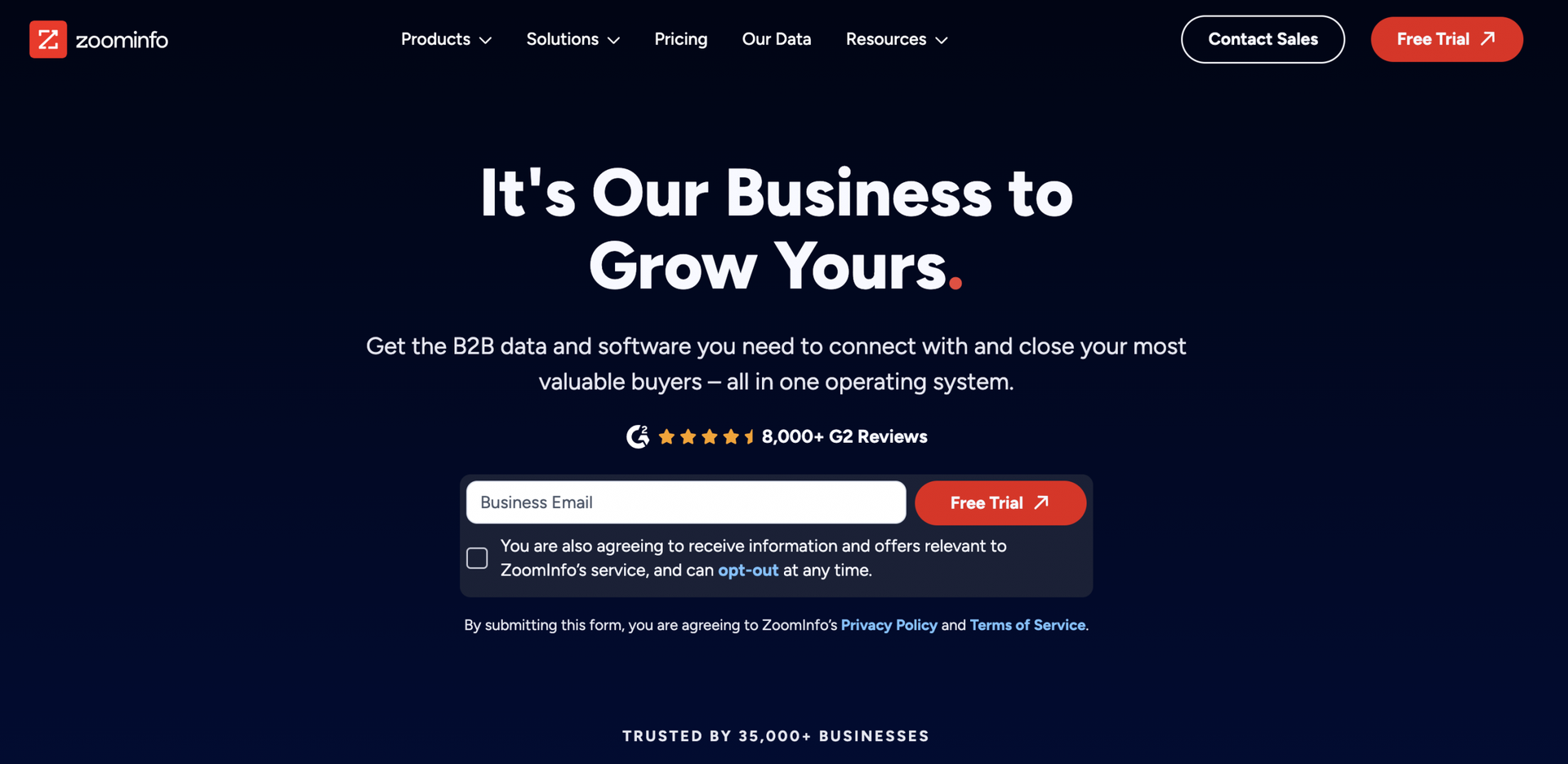
Why choose ZoomInfo over Apollo.io?
✅ Larger database: More contacts and company insights than Apollo.
✅ Better intent signals: Tracks website visits, ad engagement, and content interest.
✅ Stronger CRM integrations: Designed for enterprise-level sales teams.
✅ More detailed company insights: Includes company websites, org charts, firmographics, and tech stack data.
✅ Best for account-based sales: Ideal for targeting large companies, not just individuals.
Pricing
ZoomInfo’s pricing is custom and enterprise-focused, with plans starting around $15,000/year.
Apollo leads FAQ
Does Apollo.io offer a free trial?
Yes, Apollo.io has a free plan with limited search credits and outreach capabilities. Paid plans do not offer a trial, but you can explore the platform with the free version.
How to choose the best Apollo.io alternative?
To choose the best Apollo.io alternative, look for a tool that fits your prospecting needs, such as:
- Real-time data: Avoid outdated databases by choosing a tool that pulls fresh leads.
- Multi-channel outreach: If you need more than email, check for LinkedIn and phone automation.
- CRM integrations: Ensure it connects seamlessly with your existing workflow.
- Data accuracy: Some tools verify and enrich contacts better than Apollo.io.
- Pricing model: Compare cost-per-user vs. usage-based pricing for better value.
